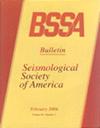JointNet:基于多模态深度学习的瑞利波频散与椭圆度联合反演方法
IF 2.9
3区 地球科学
Q2 GEOCHEMISTRY & GEOPHYSICS
引用次数: 0
摘要
多类型数据集的联合反演是高精度地下成像的有效方法。我们提出了一种基于深度学习的新方法,将瑞利波相位速度和椭圆度联合反演为地壳和最上层地幔的剪切波速度。我们设计了一个多模态深度神经网络(称为 JointNet)来分析这两个独立的物理参数,并生成包括速度和层厚度在内的输出结果。JointNet 使用随机一维模型和相应的合成相速度和椭圆度进行训练,从而降低了训练数据集的成本。使用合成数据和观测数据进行的评估表明,与基于马尔科夫链蒙特卡洛的方法相比,JointNet 得出的结果具有很高的可比性,并显著提高了反演速度。使用合成数据进行的训练确保了其在具有不同速度结构的各种区域的普遍应用。此外,JointNet 可以很容易地扩展到其他数据类型,并作为联合反演框架进一步提高成像分辨率。本文章由计算机程序翻译,如有差异,请以英文原文为准。
JointNet: A Multimodal Deep Learning-Based Approach for Joint Inversion of Rayleigh Wave Dispersion and Ellipticity
Joint inversion of multitype datasets is an effective approach for high-precision subsurface imaging. We present a new deep learning-based method to jointly invert Rayleigh wave phase velocity and ellipticity into shear-wave velocity of the crust and uppermost mantle. A multimodal deep neural network (termed JointNet) is designed to analyze these two independent physical parameters and generate outputs, including velocity and layer thicknesses. JointNet is trained using random 1D models and corresponding synthetic phase velocity and ellipticity, resulting in a low cost for the training dataset. Evaluation using synthetic and observed data shows that JointNet produces highly comparable results compared to those from a Markov chain Monte Carlo-based method and significantly improves inversion speed. Training using synthetic data ensures its generalized application in various regions with different velocity structures. Moreover, JointNet can be easily extended to include additional datatypes and act as a joint inversion framework to further improve imaging resolution.
求助全文
通过发布文献求助,成功后即可免费获取论文全文。
去求助
来源期刊

Bulletin of the Seismological Society of America
地学-地球化学与地球物理
CiteScore
5.80
自引率
13.30%
发文量
140
审稿时长
3 months
期刊介绍:
The Bulletin of the Seismological Society of America, commonly referred to as BSSA, (ISSN 0037-1106) is the premier journal of advanced research in earthquake seismology and related disciplines. It first appeared in 1911 and became a bimonthly in 1963. Each issue is composed of scientific papers on the various aspects of seismology, including investigation of specific earthquakes, theoretical and observational studies of seismic waves, inverse methods for determining the structure of the Earth or the dynamics of the earthquake source, seismometry, earthquake hazard and risk estimation, seismotectonics, and earthquake engineering. Special issues focus on important earthquakes or rapidly changing topics in seismology. BSSA is published by the Seismological Society of America.
 求助内容:
求助内容: 应助结果提醒方式:
应助结果提醒方式:


